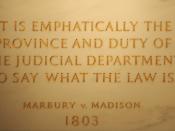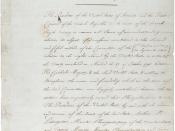The case of Marbury v. Madison (1803) has been described as "epochal", and for good reason. The case of Marbury v. Madison established the Supreme Court's power of judicial review. Judicial review is the ability of the Supreme Court to "review a law or an official act of government employee or agent for constitutionality or for the violation of basic principles of justice." This case directly shaped the future of the American public in a positive way: by making decisions that are lawfully correct and in the best interest of the public. This also had some short-term and long-term ramifications, including the decision that declared the legality of the Louisiana Purchase, the single act that doubled the size of the United States and laid the foundation for a future superpower.
The most significant short-term effect of the decision made in Marbury v. Madison was the fact that it greatly magnified the court's authority and opinion, though it can be debated that this is also a long-term effect.
Another short-term effect is the fact that the decision was a major slap at the Jeffersonians, who were very thirsty to prevent such a thing and to remove any traces of a Federalist influence in court, despite the fact that Jefferson flip-flopped on his political views several times later on. As a result of that, the Jeffersonians attempted to impeach Samuel Chase, a Federalist judge serving on the Supreme Court, because he spoke out against the Republicans. Though he was found not guilty of the charges brought against him (high crimes and misdemeanors), he became deeply unpopular and scorned by the public. The short-term effects of the decision in Madison v. Marbury were certainly important, the long-term effects certainly outweigh them.
Another significant effect of the decision in the Marbury v. Madison case...



Marbury v. Madison: It's Role in American History and It's Long-Term and Short-Term Ramifications
This essay does not explain what the decision in Marbury v. Madison actually decided, or the strange machinations that the Court had to go through to reach that decision. Without some understanding of how the decision was made, and the specific act of Congress that the decision voided, this essay fails to convey any real understanding of the decision.
The paper also more than once says that this decision in effect allowed the Louisiana Purchase. How? In making the Louisiana Purchase, Thomas Jefferson had to rely on the inherent power of the President, going beyond a strict reading of the Constitution, but no one challenged that decision in any court, let alone take the matter to the U.S. Supreme Court. Given the tremendous emphasis that this writer puts on this point, I think it is incumbent on the writer to show the connection between Marbury v. Madison, a case dealing with the appointment of a Federalist job-holder to a minor judgeship has to do with the purchase of Louisiana, which comes under the President's power to conduct foreign affairs. The Constitution gives the President the exclusive power to negotiate treaties. For ratification, he must bring the treaties before Congress. How are these powers implicated in a decision of the Supreme Court announcing that it has the power to declare legislation unconstitutional.
Also, I question the statement that the decision in Marbury greatly enhanced the power of the Supreme Court. The next time the Court declared a law to be unconstitutional was in 1855, when it asserted in the Dred Scott case that the Missouri Compromise was unconstitutional.
In short, I cannot consider this essay soundly reasoned.
1 out of 1 people found this comment useful.